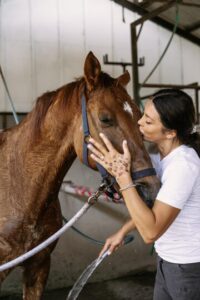Equine therapy, often referred to as equine-assisted therapy, is a unique and transformative approach that utilizes the bond between humans and horses to foster personal growth and healing. At its core, this horse therapy involves structured interactions with horses, guided by trained professionals who understand both the psychological and physical aspects of equine behavior. Through these interactions, participants engage in various activities such as grooming, riding, and caring for the horses, which can lead to profound changes in their emotional and mental well-being.
The process is not merely about riding; it’s about building a relationship with the horse, which serves as a mirror reflecting our own emotions and behaviors. This connection can help individuals gain insights into their feelings, develop empathy, and learn valuable life skills. The effectiveness of equine therapy lies in its ability to create a safe and non-judgmental environment where individuals can explore their thoughts and emotions.
Horses are incredibly intuitive animals; they can sense human emotions and respond accordingly. This responsiveness allows participants to experience immediate feedback on their actions and feelings, fostering self-awareness and personal growth. As we engage with these magnificent creatures, we learn to communicate more effectively, build trust, and develop a sense of responsibility.
The structured nature of equine therapy programs ensures that participants are guided through their experiences, allowing for reflection and discussion that can lead to deeper understanding and healing.
Key Takeaways
- Equine therapy is a form of therapy that involves interactions between patients and horses to promote emotional growth and healing.
- Horses can help improve strength, balance, and coordination in individuals through activities such as grooming, riding, and leading the horse.
- Equine therapy can provide comfort and support to individuals, helping them build confidence, reduce stress, and improve communication skills.
- Equine therapy has been found to be effective in treating PTSD, anxiety, and depression by providing a safe and non-judgmental environment for individuals to process their emotions.
- When getting started with equine therapy, it’s important to find a reputable program with certified therapists and to be open to the unique experiences and challenges that come with working with horses.
The Physical Benefits of Horse Therapy: How Horses Can Improve Strength, Balance, and Coordination

Building Strength and Coordination
When we participate in equine therapy, we are not only interacting with the horse but also engaging our bodies in various physical activities that promote strength, balance, and coordination. Riding a horse requires core stability and muscle control, as we must maintain our balance while the horse moves beneath us. This activity strengthens our core muscles and improves our overall posture.
Enhancing Upper Body Strength and Flexibility
Additionally, grooming and caring for horses involve physical exertion that can enhance our upper body strength and flexibility. Moreover, the rhythmic motion of riding has therapeutic effects that can improve coordination and motor skills.
Developing Hand-Eye Coordination and Spatial Awareness
As we learn to guide the horse through different movements, we develop better hand-eye coordination and spatial awareness. This is particularly beneficial for children and adolescents who may struggle with these skills in other contexts. The physical engagement with horses also encourages an active lifestyle, which is essential for maintaining good health. By participating in equine therapy programs, we not only reap the benefits of physical activity but also cultivate a sense of accomplishment as we master new skills and overcome challenges.
The Emotional and Mental Health Benefits of Equine Therapy: How Horses Can Provide Comfort and Support
The emotional and mental health benefits of equine therapy are profound and far-reaching. Horses have an innate ability to provide comfort and support to individuals facing various challenges. As we interact with these gentle giants, we often find solace in their presence.
The act of grooming or simply being near a horse can evoke feelings of calmness and tranquility, helping to alleviate stress and anxiety. This therapeutic relationship allows us to express emotions that may be difficult to articulate verbally, creating a safe space for healing. Furthermore, equine therapy fosters emotional resilience by encouraging us to confront our fears and insecurities in a supportive environment.
As we learn to communicate with horses, we also learn about ourselves—our strengths, weaknesses, and coping mechanisms. This self-discovery process is crucial for building confidence and self-esteem. The bond we form with the horse can serve as a powerful reminder that we are capable of overcoming obstacles, both in the arena and in our daily lives.
Through this journey of emotional exploration, we gain valuable tools for managing our mental health and navigating life’s challenges.
The Role of Equine Therapy in Treating PTSD, Anxiety, and Depression
Equine therapy for anxiety and horse therapy for mental health have emerged as promising approaches for individuals coping with PTSD, anxiety, and depression. The unique bond that forms between humans and horses offers a pathway to healing that often complements traditional therapies. For those managing PTSD, interacting with a horse can create a profound sense of safety and grounding, which can be challenging to find in daily life.
Through equine therapy, participants learn to regulate emotions and develop coping skills to manage trauma-related triggers. Beyond providing comfort, horse therapy encourages individuals to confront their feelings constructively. The process requires being fully present, which can be especially therapeutic for those experiencing anxiety or depression.
By focusing on the horse’s needs and behaviors, participants naturally shift attention away from personal worries, fostering mindfulness that aids emotional regulation and healthier coping mechanisms. As individuals progress, they often feel more empowered and equipped to handle their mental health challenges effectively.
Getting Started with Equine Therapy: Finding a Program and What to Expect
If we are considering equine therapy as a means of personal growth or healing, the first step is to find a reputable program that aligns with our needs. Many organizations offer equine-assisted therapy services tailored to various age groups and mental health challenges. It’s essential to research different programs to ensure they have qualified professionals who are experienced in both equine care and therapeutic practices.
We should look for programs that emphasize safety, structure, and individualized support to maximize our experience. Once we find a suitable program, it’s important to understand what to expect during our sessions. Typically, equine therapy involves a combination of groundwork activities—such as grooming or leading the horse—and mounted sessions where we ride under supervision.
Each session is designed to promote personal growth through structured activities that encourage reflection and discussion. As we embark on this journey, we should remain open-minded and willing to engage fully in the process. The transformative power of equine therapy lies in our willingness to connect with the horses and embrace the lessons they have to offer.
In conclusion, equine therapy presents an incredible opportunity for growth, healing, and empowerment through structured interactions with horses. By engaging in these programs, we not only improve our physical health but also nurture our emotional well-being. The benefits extend far beyond the riding arena; they permeate every aspect of our lives as we develop resilience, confidence, and essential life skills.
Experience the healing power of horses with Compton Jr. Equestrians’ transformative programs. Whether you’re interested in fostering growth for children or adults, these programs offer a unique journey toward healing and empowerment through the powerful bond between humans and horses.
If you’re interested in exploring more about the therapeutic benefits of interacting with horses, you might find the article “Connect with Our Horses” particularly enlightening. This piece delves into how forming connections with horses at Compton Jr. Equestrians can significantly aid in emotional and psychological healing. For those considering horse therapy or wanting to understand its impact better, this article provides valuable insights into the process and benefits. You can read more about it by visiting Connect with Our Horses.
FAQs
What is horse therapy?
Horse therapy, also known as equine therapy, is a form of therapy that involves interactions between patients and horses. It can encompass various activities such as horseback riding, grooming, and caring for horses, and is often used as a therapeutic intervention for individuals with physical, emotional, or cognitive challenges.
What are the health benefits of horse therapy?
Horse therapy has been shown to have numerous health benefits, including improved balance, coordination, and muscle strength. It can also help reduce stress, anxiety, and depression, and improve overall emotional well-being. Additionally, horse therapy has been found to be beneficial for individuals with autism, ADHD, and other developmental disorders.
How does horse therapy work?
Horse therapy works by utilizing the unique bond between humans and horses to facilitate emotional and physical healing. Interactions with horses can help individuals develop trust, empathy, and communication skills, while the rhythmic and repetitive movements of horseback riding can have a calming and therapeutic effect on the body and mind.
Who can benefit from horse therapy?
Horse therapy can benefit a wide range of individuals, including those with physical disabilities, mental health challenges, trauma survivors, and individuals seeking personal growth and self-discovery. It is also used as a complementary therapy for conditions such as PTSD, anxiety, and depression.
Is horse therapy safe?
When conducted under the supervision of trained professionals, horse therapy is generally considered to be safe. However, it is important for individuals participating in horse therapy to follow safety guidelines and receive proper instruction and supervision to minimize the risk of injury.
